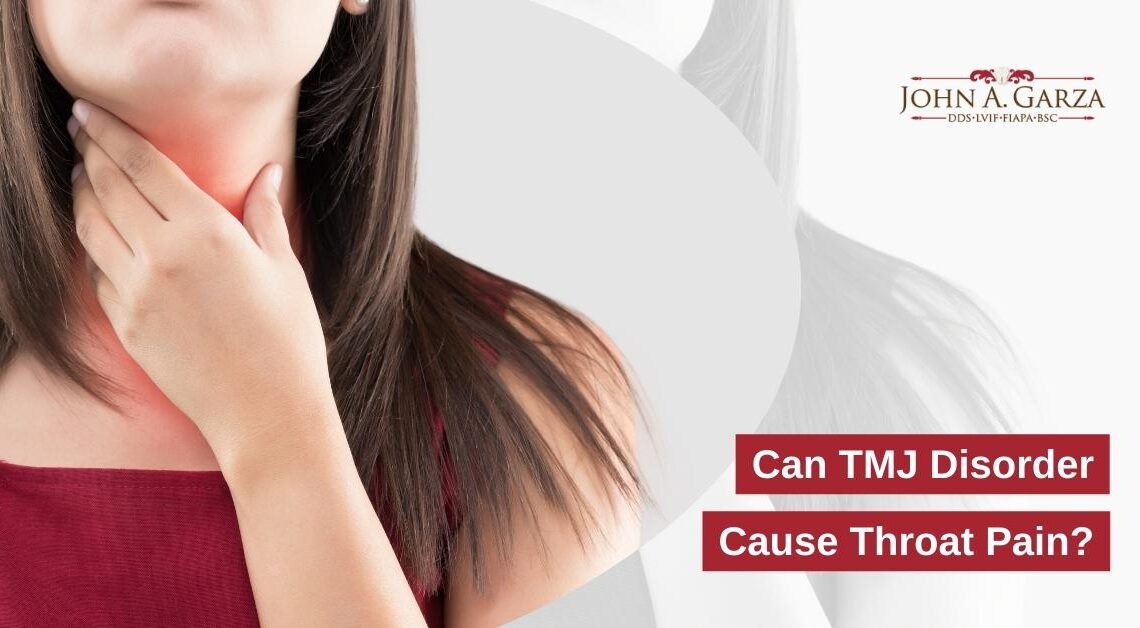Sore throat and ear pain can sometimes occur at the same time. What causes this? What if you have a sore throat on one side but not the other? How is that possible?
Suppose you experience pain in your throat that seems to come and go; it’s possible that you’re suffering from TMJ disorder. This condition can cause many symptoms, including pain in the jaw, neck, ears, and throat. While TMJ disorder is not traditionally thought of as a problem that affects the throat, it can lead to some very troublesome symptoms. See your dentist for a diagnosis and treatment plan if you’re experiencing throat pain and think it might be related to TMJ disorder.
Temporomandibular Joints
The TMJ is a ball and socket hinge in the back of the jaw. The articular eminence (AE), a bony hump at the front of the socket, keeps the jaw from slipping out of place.
The temporomandibular joint is the joint that connects your jawbone to your skull. It’sIt’s responsible for all of the motion that happens when you open and close your mouth. TMJ dysfunction can cause pain in the jaw, clicking or popping of the joint, and limited range of motion.
There are several causes of TMJ dysfunction, including injuries to the joint, arthritis, grinding or clenching your teeth, and stress. Treatment options vary depending on the cause of the dysfunction. Still, they may include pain relief medications, braces or orthodontics to correct malocclusion (poor alignment of the teeth), physical therapy, and surgery.
Signs That You May Have TMJ Disorder
The symptoms of TMJ vary greatly depending on the individual. To simplify things, here’s a list of the most common symptoms that TMD patients often report having when they see dentists for a TMJ appointment.
Bruxism
It has been reported that some patients with TMJ subconsciously catch themselves grinding their teeth during the day. In addition to this behavior happening while you’re awake and even after sleeping for hours at nighttime too! The most common symptom of nighttime bruxism is waking up having had a headache nearly every morning since it begins sometime around 2 AM or 3 AM in many cases, which means there’s pretty much no restful sleep going on here either way if one grinds their jaw muscles off constantly throughout these times.
Keep an eye on it if you grind and clench your teeth during the day or at night while sleeping. If it happens regularly (a few times each week), make an appointment with Lifetime Smiles in Johns Creek for a TMJ evaluation.
Frequent Headaches
This is one of the most common signs of a Temporomandibular Joint condition. In addition, there is a strong correlation between frequent headaches and TMJ disorder. Many people who suffer from frequent headaches also have a TMJ disorder.
TMJ disorder is a condition that affects the temporomandibular joint, which is the joint that connects the lower jaw to the skull. When this joint is misaligned or not functioning properly, it can cause pain in the jaw, neck, and head. It can also lead to problems with chewing, speaking, and swallowing.
If you are experiencing frequent headaches, it is essential to see a dentist or doctor who can diagnose whether or not you have TMJ disorder and provide treatment if necessary.
Blurry Vision
It is possible that blurred vision can be a sign of TMJ disorder. TMJ disorder is a condition that affects the temporomandibular joint, which is the joint that connects the jawbone to the skull. Symptoms of TMJ disorder can include:
- Awful jaw pain.
- Popping or clicking sounds when opening and closing the mouth.
- Problems with chewing or swallowing.
Blurred vision may be present in some people with TMJ disorder because of tension headaches. Tension headaches are a common symptom of TMJ disorder and can cause pain in the forehead, temples, or back of the head, as well as blurred vision. If you are experiencing blurred vision and other TMJ disorder symptoms, setting a dentist appointment as soon as possible is important.
Sore Throat and Swallowing Issues
Have you ever had a constant throat pain that won’t go away? What about swallowing issues? Have you seen your general practitioner and potentially an ENT doctor, but they can’t figure out what’s wrong?
TMJ condition symptoms vary depending on the individual, but in addition to headaches, jaw discomfort, ear pain, hazy vision, and many other issues that TMJ sufferers face, a sore throat is a common complaint.
Experience a chronic sore throat or difficulty swallowing in addition to any of the other symptoms on this list. Then, it may be time to schedule a TMJ evaluation and prevent further permanent damage.
Ear Pain or Ringing in the Ears
Tinnitus can be caused by various factors, including extended exposure to loud music or discharging a gun without proper ear protection.
Tinnitus may not have an apparent underlying cause in TMJ patients, but when paired with other symptoms, it can be connected back to TMJ. So, if you’re experiencing a strange ringing in your ears, it could be a symptom that you’re having a temporomandibular joint dysfunction.
If ringing in your ears persists and you are experiencing other TMJ symptoms as well, make sure to call your dentist with experience in TMJ disorder.
Read more: Does TMJ Disorder Cause Face Distortion?
Consult Garza DDS to Learn More About What to Do with TMJ Pain
If you are experiencing pain in your throat, it’s essential to consult a dentist like Dr. Garza, who specializes in TMJ disorder and can help you find relief. There are many potential causes of throat pain, and TMJ disorder is just one of them. However, it’s important to rule out any possible connection between your TMJ symptoms and your throat pain. Once Dr. Garza has had a chance to evaluate your condition, he can discuss with you the best treatment plan for alleviating your discomfort.


